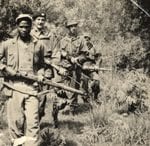Withdrawal from Empire – Kenya
The Gloucestershire Regiment’s posting to Kenya in 1955 was the first of many overseas tours during what was to become the United Kingdom’s withdrawal from Empire. Kenya had been in the turmoil for several years as a result of an insurrection led by the Kikuyu tribe against British rule. The main grievance was the ownership of land. By 1955, the insurrection was already well down the road to defeat, although the Gloucesters would still be involved in patrolling, and operations launched to hunt down and apprehend or kill the remaining insurgents.
The Gloucesters formed part of 49th Independent Infantry Brigade and took over from the Black Watch in Gil Gil on 1st April, from where the various companies were allocated areas of responsibility in which they set up temporary camps. These were frequently on European owned farms, where they were made very welcome. Companies actively patrolled their areas with the help of local guides, looking for Mau Mau gangs. The internal politics of the country was largely decided along tribal lines, with the driving force of Mau Mau being centered among the Kikuyu, together with the Embu and Meru. The Masai, Samburu and Wakamba were not affected and provided scouts, guides and police for the British. It was a typical counter-insurgency conflict, fought in difficult terrain at altitudes of over 5,000 feet and which varied from grass savannah to thick bamboo jungle. The complication of plentiful and sometimes hostile wildlife added to the experience and sometimes amusement. A report filed from “B” Company noted:-
“Heavy patrolling has been carried out in the aptly named “badlands” west of Gilgil. The Company met with some success, Lieutenant Rudgard’s patrol finding some terrorist equipment including a medical haversack which contained, amongst other things, a tin of Eno’s Fruit Salts! Lieutenant Brasington’s patrol found a hide with the fire still smoking, but in both cases the Mau Mau were not tracked. The “badlands” are floored with volcanic lava and tracking is all but impossible. Corporal Lyall, who has the distinction of being the first Gloucester to wound a Mau Mau whilst in the advance party, shot a large buck which was cooked on return to the Company camp, and Corporal Mellor scared the wits out of a herd boy who was in a place forbidden to all Africans. At the time of writing Lieutenant Rudgard’s platoon has gone to West Kipipiri to help farmers wire their labour in and Captain Ellis is planning another operation.”
From Gil Gil the Gloucesters concentrated their efforts upon Kipipiri and the western range of the Aberdare Mountains, where it was estimated that between 3-4,000 Mau Mau were still at large. Operation followed operation – “Gimlet”, “Royal Flush” “Dante”, “Rhino Lookout”, “Donkey’s Carrot”, “Wheatsheaf” “Bulrush”, and, finally for the Gloucesters, “Full Stop”,
“C” Company prided itself of having killed more terrorists than the rest of the Battalion put together, although during Operation “Gimlet” the majority of “C” Company
“. . . had to climb to the summit plateau of the Aberdares, 12,400 feet high, and to operate there for three weeks in a distinctly wet and chilly climate. The only enemy seen were herds of elephants, rhino and buffalo, which turned out to be far more dangerous than the elusive Mau Mau. Meanwhile Second-Lieutenant Rudd and some of No. 7 Platoon formed (he says) a highly successful reserve back at base and had all the fun killing a number of terrorists not far from Company H.Q.”
The Battalion’s Intelligence Section report noted:-
“. . . Our duties range from the interrogation of Mau Mau prisoners to convincing company commanders that the maps they want are out of print. We also collect extraordinary loot for the Regimental Museum.
“The enemy is extremely cunning and yet ridiculously comic in many ways. Presuming that the pen is mightier than the sword (or simi) they keep diaries, carefully recording their raids and outrageous crimes. The diaries include lists of gangs and promotions. Examples are “R.S.M.” Mwangi is promoted “Brigadier,” and “Corporal” Wamboi, daughter of Maina is promoted “R.S.M.”
“Mau Mau is a religion, a foul perverted fanaticism based on superstition. Their oaths are revolting ways of dragging a man’s self respect into a slough of superstitious fear. While submitting to a filthy ceremony, the initiate is made to swear that he will do certain things “or this oath may kill me.” The superstition is strong enough to convince many members of the movement that they will die some horrible death if they break their oath. Many Mau Mau are quite well educated. Their letters and documents are often well written and neatly compiled.”
The first elections of Africans to the Kenyan Legislative Council took place in 1957 and Kenya achieved full independence as a member of the Commonwealth on 12th December 1963.
The Gloucesters left Kenya in March 1956, flying from Kenya to what was to become another hot spot of Empire – Aden.
Picture: Glosters patrol with scouts near Kipipiri, Kenya.


